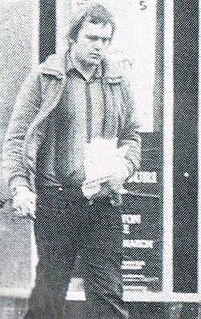Related Research Articles

The British Movement (BM), later called the British National Socialist Movement (BNSM), is a British neo-Nazi organisation founded by Colin Jordan in 1968. It grew out of the National Socialist Movement (NSM), which was founded in 1962. Frequently on the margins of the British far-right, the BM has had a long and chequered history for its association with violence and extremism. It was founded as a political party but manifested itself more as a pressure and activist group. It has had spells of dormancy.
Column 88 was a neo-Nazi paramilitary organisation based in the United Kingdom. It was formed in the early 1970s, and disbanded in the early 1980s. The members of Column 88 undertook military training under the supervision of a former Royal Marine Commando, and also held regular gatherings attended by neo-nazis from all over Europe. The name is code: the eighth letter of the alphabet 'HH' represents the Nazi greeting 'Heil Hitler'. Journalist Martin Walker described Column 88 as a "shadow paramilitary Nazi group".

The White Defence League (WDL) was a British neo-Nazi political party. Using the provocative marching techniques popularised by Oswald Mosley, its members included John Tyndall.
The British Democratic Party (BDP) was a short-lived far-right political party in the United Kingdom. A breakaway group from the National Front, the BDP was severely damaged after it became involved in a gun-running sting and was absorbed by the British National Party.
The National Party of the United Kingdom (NP) was a short-lived splinter party from the British National Front (NF). It was formed on 6 January 1976, and was dissolved in 1984.
The Constitutional Movement was a right wing political group in the United Kingdom. It was formed in 1979 by Andrew Fountaine as the National Front Constitutional Movement, a splinter group from the National Front. Offering a more moderate alternative to the NF, the Constitutional Movement claimed to have 2000 members by 1980.
The Greater Britain Movement was a British far right political group formed by John Tyndall in 1964 after he split from Colin Jordan's National Socialist Movement. The name of the group was derived from The Greater Britain, a 1932 book by Oswald Mosley.
Martin Guy Alan Webster is a British neo-nazi, a former leading figure on the far-right in the United Kingdom. An early member of the National Labour Party, he was John Tyndall's closest ally, and followed him in joining the original British National Party, the National Socialist Movement and the Greater Britain Movement. Webster also spent time in prison for helping to organise a paramilitary organisation, Spearhead, and was convicted under the Public Order Act 1936. Rumours of his homosexuality led to him becoming vilified in far-right circles, and he quietly disappeared from the political scene.
Raymond Hill was a former leading figure in the British far right who went on to become a well-known informant. A sometime deputy leader of the British Movement and a founder member of the British National Party, Hill also secretly worked for Searchlight in feeding information about the groups' activities.
Michael McLaughlin, also known as Michael Walsh is a British neo-Nazi. Born in Liverpool, McLaughlin was the son of an Irish republican and socialist, who was a veteran of the International Brigades.
The National Socialist Action Party was a minor British neo-Nazi political party in the early 1980s. It gained notoriety due to its violent rhetoric and because of several exposés regarding the group's stockpiling of weapons and its plans for armed attacks.

The League of St George is a neo-Fascist organisation based in the United Kingdom. It has defined itself as a "non-party, non-sectarian political club" and, whilst forging alliances with different groups, has eschewed close links with other extremist political parties.
John Graeme Wood was an English politician who was prominent on the far-right political scene from the late 1950s until his death.
Denis Pirie is a veteran of the British far right scene who took a leading role in a number of movements.

Anthony Hancock was a publisher who created literature for British far right groups and a member of such organisations in the United Kingdom.
The South African National Front, also known as the National Front of South Africa (SANF) was a neo-fascist organisation in South Africa formed in 1977. It was an initiative of John Tyndall of the British National Front; sister organisations were also formed in Australia and New Zealand at the same time.

The Union Movement (UM) was a far-right political party founded in the United Kingdom by Oswald Mosley. Before the Second World War, Mosley's British Union of Fascists (BUF) had wanted to concentrate trade within the British Empire, but the Union Movement attempted to stress the importance of developing a European nationalism, rather than a narrower country-based nationalism. That has caused the UM to be characterised as an attempt by Mosley to start again in his political life by embracing more democratic and international policies than those with which he had previously been associated. The UM has been described as post-fascist by former members such as Robert Edwards, the founder of the pro-Mosley European Action, a British pressure group.
Edward Budden was a British veteran of the far right who was well known in such circles for his satirical columns that appeared in a number of publications down the years.
References
- ↑ The Very Strange World of Steven Books Archived 2008-09-22 at the Wayback Machine
- ↑ In Mosley's Union Movement Archived 2008-09-22 at the Wayback Machine
- ↑ David Boothroyd, The History of British Political Parties, Politicos, 2001, p. 3
- ↑ Ray Hill & Andrew Bell, The Other Face of Terror, London: Grafton, 1988, p. 184.
- ↑ David Turner's homepage Archived 2006-06-17 at the Wayback Machine
- ↑ Ray Hill & Andrew Bell, The Other Face of Terror, London: Grafton, 1988, p. 165
- ↑ Promotion of journal from British Peoples Party site
- ↑ Searchlight acts to stop Tesco sale of Nazi books